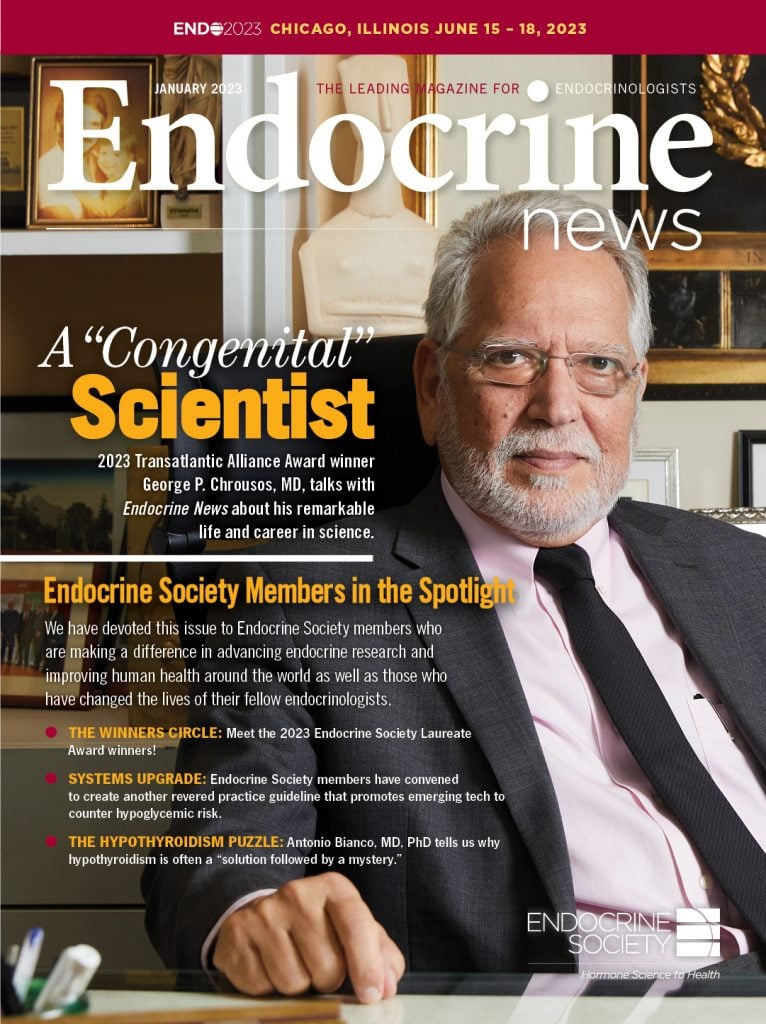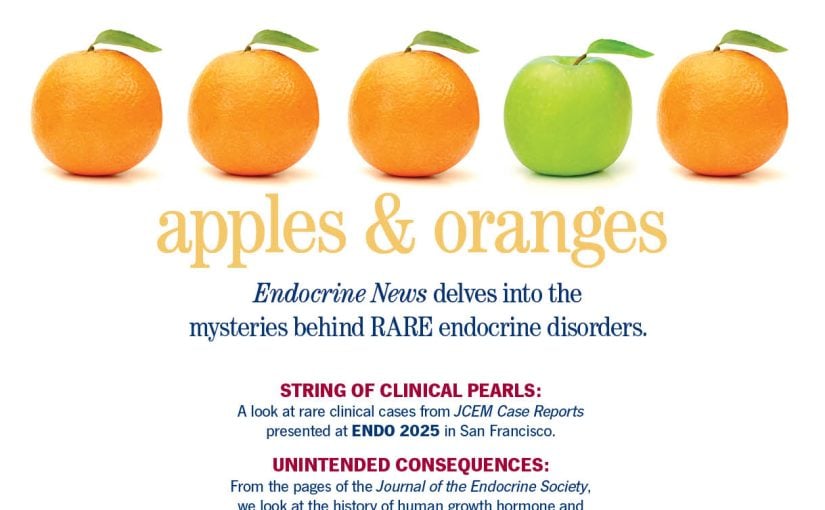
Recapping the January 2023 Endocrine News
As we kick off a new year, the January 2023 Endocrine News is paying special tribute to those individuals who have made the field of endocrinology so remarkable, the outstanding members of the Endocrine Society.
And what better way to start crowing about our outstanding members than with the 2023 Endocrine Society Laureate Award recipients. In the January issue, we devoted 15 pages to these leaders in the practice and science of endocrinology who represent endocrinologists around the world for their seminal research, meritorious service, leadership and mentorship, innovation, entrepreneurship, international contributions, education, translation of science to practice, as well as lifetime achievement. As usual, it’s a very impressive list!
Once again, we are including the Laureates’ own thoughts with their bios in the form of brief Q&As so we can get their thoughts on not only how the Society has helped them throughout their career, but also any advice they might have for our early-career members. As we know, each new generation can learn so much from the ones that preceded it and we thought this would be a fun way to engage with our Laureates in a more accessible manner than in years past because, let’s face it, everyone’s journey through the endocrinology profession is different and everyone has something to learn just as everyone has something to teach.
Their profiles are being posted regularly, but be sure to check out the 2023 Fred Conrad Koch Lifetime Achievement Award recipient, Mitchell A. Lazar’s profile that kicked off the entire section. [To read about the other 2023 award winners, just use the search term “Meet the 2023 Endocrine Society Laureates.”]
This year’s Roy O. Greep Award for Outstanding Research recipient, Joseph Bass, MD, PhD, the Charles F. Kettering Professor of Medicine at Northwestern University Feinberg School of Medicine in Chicago, Ill., says that the scientific community “beginning with mentors and extending to students and trainees, is the most meaningful part of the long trajectory, and buffers the bumps that inevitably occur along the way.”When asked what his advice would be for those just beginning their careers in endocrinology, he continues, “There is not a single pathway; instead there are many varieties of problems that offer an equally diverse range of solutions as there are career possibilities. In part, the luck of landing on an unexplored territory and recognizing how to acquire expertise to expand into uncharted space ultimately moves us collectively forward in our own individual careers and as members of a broader community.”

On the cover of the January issue, we featured another award-winning Endocrine Society member, George Chrousos, MD, ScD, who is the recipient of the 2023 Transatlantic Alliance Award, presented by both the Endocrine Society and the European Society of Endocrinology. In “The ‘Congenital’ Scientist,” Chrousos talks to writer Kelly Horvath about what this award means to him, conducting pioneering research on two different continents, the importance of studying stress, and why he became an endocrinologist in the first place. “Research advances in endocrinology are rapid, novel, consequential, and very exciting,” he explains when asked what he finds exciting in endocrine research at the moment. “Novel hormones and mechanisms are being discovered almost every week, and it will not be long before we solve clinical problems that today we consider unsolvable. Obesity, type 1 diabetes mellitus, endocrine tumors, cardiometabolic problems, etc., will become the past.”
Let’s face it, everyone’s journey through the endocrinology profession is different and everyone has something to learn just as everyone has something to teach.
The expertise of Endocrine Society members is on full display with yet another release of a Clinical Practice Guideline, the most lauded treatment protocols in the field. Eric Seaborg reports on the newest installment, “Management of Individuals with Diabetes at High Risk for Hypoglycemia: An Endocrine Society Clinical Practice Guideline,” in “Systems Upgrade: A New Endocrine Society Guideline Promotes Technology to Counter Hypoglycemic Risk.” As technologies such as continuous glucose monitoring and insulin pumps reduce the threat of hypoglycemia in people with diabetes, this latest guideline on hypoglycemia in diabetes urges a broader use of this technology, as well as the new insulin formulations. David C. Lieb, MD, of the Eastern Virginia Medical School, Norfolk, Va., and a co-chair of the guideline writing committee comments that previously, everyone on insulin had a “kit” at home for glucagon injections, often from a family member, to treat low blood sugar. “But those kits required reconstitution of the glucagon with saline before they could be injected, and many of those who tried to give it misused it, leading to no glucagon being given or underdosing of the glucagon,” he explains. “There are new forms of glucagon that are much easier to inject. There is even a nasal form that can be inhaled.”

Senior editor Derek Bagley talks with Antonio Bianco, MD, PhD, about his recent book, Rethinking Hypothyroidism, and why researchers and clinicians have sometimes been confounded by hypothyroidism in “Solving the Hypothyroidism Puzzle.” He explains that hypothyroidism treatment is a “solution followed by a mystery” and hopes his book will answer many questions from clinicians and researchers alike, as well as from patients living with this condition.
We hope this issue helps get your 2023 off to a great start and that you enjoy sharing in our bragging rights about the expertise of Endocrine Society members. And remember, if you have a story idea you think would be a good fit for Endocrine News, be sure to send me an email at: [email protected]. Happy New Year!
Be sure to download a PDF of the entire issue here!

